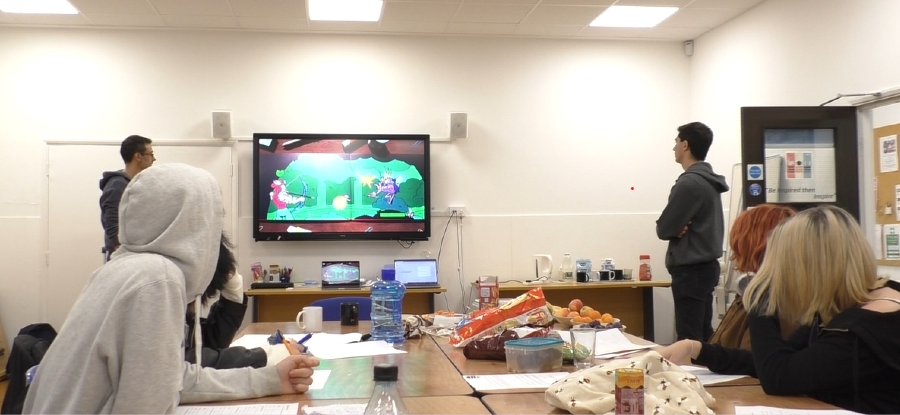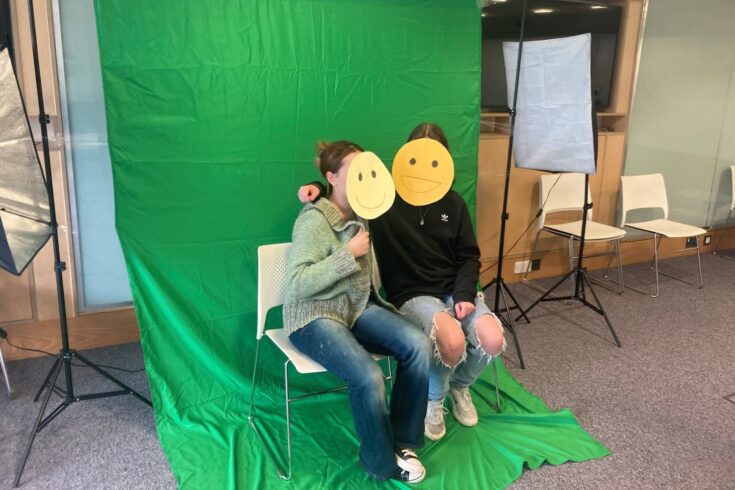Making meaningful connections is the theme of this year’s Children’s Mental Health Week. It’s also hard-wired into the DNA of a £35 million research programme that’s part of the government’s Strategic Priorities Fund.
Equitable voices
Young people’s voices run as a common thread through all the awards funded by the Adolescence, Mental Health and the Developing Mind (AMHDM) initiative. They even helped set the agenda of the funding opportunity itself through a Young Person’s Advisory Group. They raised loneliness as an issue that can have a negative impact on mental health. This, alongside other gaps they identified in mental health literature, was then used as a theme for a recent £8 million methodological innovation funding opportunity.
Professor Paul Cooke was awarded funding for the 3-year CREATE project. The project aims to develop tools to help young people, scientists and arts researchers to study adolescent mental health together.
Professor of World Cinemas at the University of Leeds, Paul is an experienced participatory filmmaker: “It was a really good example of genuine co-production. It seemed to me, from where I was looking as an applicant, that all the different voices of stakeholders were genuinely given equal weight. The voice of young people in the bid was really helpful and genuinely constructive.”
Aiming to strengthen multidisciplinary research connections, the AMHDM initiative is co-funded by:
- the Medical Research Council
- the Arts and Humanities Research Council
- the Economic and Social Research Council
Rising demand for mental health support
Funded projects connect multidisciplinary teams with young people who are living with mental health issues. “Mental health has a rising demand. We see in university, a rising trend of student support services to support our students’ mental health,” explains serious games expert, Professor Minhua Eunice Ma.
Eunice is a Professor of Games Technology and Deputy Vice Chancellor and Provost of Falmouth University. She co-leads the 4-year ATTUNE research programme with Professor Kamaldeep Bhui, one of the AMHDM initiative’s 7 flagship awards which is now in its second year. Paul is a co-investigator working on this programme, as well as leading the CREATE project.
Young people who have experienced trauma, also known as adverse childhood experiences, have a much higher risk of experiencing mental health problems in their later life. According to the NHS Digital Survey 2020, 1 in 6 young people (16%) aged 5 to 16 years had a probable mental disorder. This figure increased with age to 1 in 5 (20%) among young adults aged 17 to 22 and was more common in young women.
Using digital arts to fill a gap
By connecting with these young people, the ATTUNE programme is aiming to address the gap between available NHS healthcare services for young people to access and the rising demand.
“We engage with young people from various sites: some are urban, some are rural, some are coastal. So the challenge is very different in different places,” says Eunice. “Using digital-based interventions, including games, can increase not only engagement, but also can significantly increase the cost effectiveness and accessibility to healthcare.”

Game workshop with young people on the project ATTUNE. Credit: Eunice Ma
Co-creating with young people
Eunice has seen first-hand how co-designing computer games with young people can make a difference. On a EU-funded and Global Challenges Research Fund project, she led the development of an anti-violence computer game called ‘None in Three’. It helped change attitudes to domestic and gender-based violence and has since been rolled out across 4 other countries worldwide.
Story-driven ‘serious games’ explore the reality of young people’s experiences using a medium that young people are passionate about. “We had young people volunteer as a voice actor to use their voice in a game character. They helped write the script of their story. And they contributed to, not only the design but, the actual production of the video game,” she explains.
And through the ATTUNE programme, she will now co-create another computer game. “We are in the concept development stage of the game. Our concept design includes mini games, with stories young people can relate to, that can be accessed within a hub space, equivalent to a real-world safe space. Stories will be embedded in the game through comic books or personal journals. Each story will relate to friends who have different problems or relate to different types of adverse childhood experiences.”
Young-person-owned solutions
Multidisciplinary teams will collect the data Eunice and her team need to make sure that young people’s stories are embedded into the design. The programme will engage young people in different art forms to reflect their experiences. This includes filmmaking, visual arts, animation and dance which will inform the game design and development.
Paul’s interested in how arts-based practices can support young people to come up with their own solutions to the issues that impact them. “My role in ATTUNE has been to develop a series of youth film crews. They’ve been making films about their experience of adverse childhood experiences. Very early on, one of the young people that we engaged in our filmmaking came up with a statement that really stuck with me. He said, ‘We are the experts on us.'”
“They’re also being trained to critically reflect on the development of the project as it’s going on. And to use that critical reflection to inform the way the project is communicated both across and beyond the project team.”
Shared vocabulary, better connections
There’s a large consensus that arts-based practices in mental health are a good thing, from dance to animation and visual arts. “But when you start to really talk to all the stakeholders involved, you can see that there’s kind of a communication issue” says Paul.
This sparked the idea for the CREATE project. Paul and his team are aiming to create a shared vocabulary of what arts-based practices are trying to do and the extent to which they can genuinely add value to mental health research. They will draw on some of the data generated by ATTUNE, as well as other projects funded by the AMHDM programme. In so-called ‘Living Labs’ they’ll bring together arts practitioners, scientists, social scientists, young people and professionals with the aim to iron out miscommunication and develop tools to help engage others.
Eunice and Paul agree unanimously on the power of participation and on listening to what young people have to say. And both ATTUNE and CREATE are ensuring that young people are shaping the research that’s aiming to improve their mental health.
Find out more
Watch a video about the ATTUNE programme.
Read summaries of all projects funded by the AMHDM programme
The AMHDM initiative will be recruiting a programme director in spring 2023. Find out more in the funding opportunity under ‘Opportunities, support and resources available’.
Access resources from the Mental Health Research Matters team, funded by a cross-council impact and engagement award. This team champion the work of 8 UK Research and Innovation-funded mental health research networks. In autumn 2022 they launched a digital conversation about:
- why mental health research matters
- what good mental health research looks like
- how you can get involved to make a difference
Top image: Young people in front of a green screen making a film about the pressures of teenage life in Falmouth. Credit: Paul Cooke




